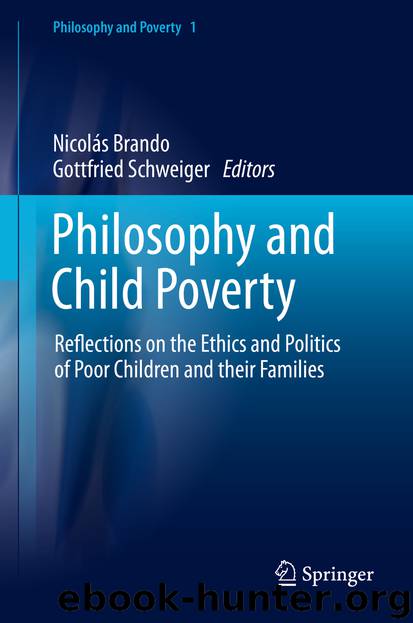Philosophy and Child Poverty by Unknown

Author:Unknown
Language: eng
Format: epub
ISBN: 9783030224523
Publisher: Springer International Publishing
The mother’s body and brain are biologically organized to promote this provision through a multitude of modifications within the mother’s psycho-physical economy. The hormonal changes which accompany pregnancy continue long after birth, as a mother’s interactions with her child affect her affective repertoire, perceptual processes and cognitive biases in ways that (typically) motivate heightened responsiveness to her child’s needs and wants. (Steinberg 2010). Even beyond infancy and well into the pre-school years, a child’s emotional signals to his mother continue to activate a range of psycho-physical responses (e.g., the release of oxytocin) affecting his attentional focus, affective arousal and, at the experiential level, his motivation to maintain proximity. Reciprocally, the child’s focus for his development of emotional expressions and his guide to his social referencing is his primary caregiver – most often his mother. (Steinberg 2010) These ubiquitous natural mechanisms potentially promote the persistence of mothers’ engagement with their children throughout their early years and beyond.
All of this is well known to developmental scientists, child psychologists, pediatricians, social service practitioners and others who engage professionally with child welfare. What is less often recognised, however, is the extent to which it features in the subjective, evaluative perspective of mothers themselves. A woman’s intimate ties with her child are experienced not merely as one set of desires and intentions alongside others, but as a personal imperative: caring for her child’s needs is not just something that she typically wants to do, but that she feels she must do – a commitment that is bound up with her integrity and psychological identity.19 In philosophical terms, this is effectively a moral imperative – not merely a contingent motivation to which a woman happens to be sensitive, but a normative requirement to which she feels herself accountable, whatever other motives she may have. Moreover, the imperative at stake – in the ordinary experience of many ordinary mothers – is not the agent-neutral one requiring of just anyone that they care for just any child. It is experienced as an agent-relative one, making an essential, first-personal reference to the mother’s specific obligations to her child.
It is, of course, possible to mistakenly experience oneself as subject to a moral imperative. Racists, xenophobes, misogynists and murderers frequently take themselves to be acting on moral requirements which should be dismissed as imaginary. It is not my aim here to assess the accuracy of the maternal moral sensibility; what matters in this context is how some mothers intuitively perceive and respond to their commitment to their children – not whether their judgments comply with this or that normative theory. Nonetheless, it is worth noting that such intuitions are familiar the world over, and widely regarded as legitimate and warranted; we do not typically dismiss them as pathological aberrations. Even a debunking, evolutionary view of moral intuitions can only dismiss them to a point: a mother’s special commitment to her own offspring is plainly adaptive for our species, and is at least in that respect wholly justified for those who think human survival a good thing.
Download
This site does not store any files on its server. We only index and link to content provided by other sites. Please contact the content providers to delete copyright contents if any and email us, we'll remove relevant links or contents immediately.
Kathy Andrews Collection by Kathy Andrews(10544)
The remains of the day by Kazuo Ishiguro(7570)
Spare by Prince Harry The Duke of Sussex(4217)
Paper Towns by Green John(4175)
The Body: A Guide for Occupants by Bill Bryson(3813)
Be in a Treehouse by Pete Nelson(3231)
Harry Potter and the Goblet Of Fire by J.K. Rowling(3065)
Goodbye Paradise(2973)
Never by Ken Follett(2904)
Into Thin Air by Jon Krakauer(2711)
The Remains of the Day by Kazuo Ishiguro(2626)
The Genius of Japanese Carpentry by Azby Brown(2613)
The Cellar by Natasha Preston(2602)
Drawing Shortcuts: Developing Quick Drawing Skills Using Today's Technology by Leggitt Jim(2534)
120 Days of Sodom by Marquis de Sade(2444)
Architecture 101 by Nicole Bridge(2355)
Machine Learning at Scale with H2O by Gregory Keys | David Whiting(2308)
The Man Who Died Twice by Richard Osman(2304)
Industrial Automation from Scratch: A hands-on guide to using sensors, actuators, PLCs, HMIs, and SCADA to automate industrial processes by Olushola Akande(2109)
